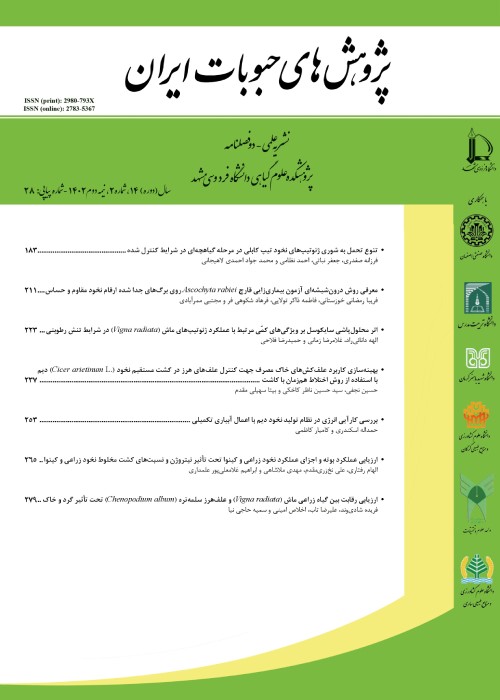The effects of rhizobium bacteria (Rhizobium leguminosarom biovar phaseoli) on yield of common bean in greenhouse and field experiments under drought stress condition
Author(s):
Article Type:
Research/Original Article (دارای رتبه معتبر)
Abstract:
Introduction
The common bean (Phaseolus vulgaris L.) is the world’s most important legume grown for human nutrition. Legumes and their symbiotic root nodule bacteria are extremely sensitive to drought stress. The fact that N2 fixation is more sensitive to decreasing soil water content relative to leaf gas exchange constitutes an important constraint on N2 accumulation and the yield potential of legumes subjected to soil drying. We hypothesize that inoculation of bean with rhizobium strains mitigates some of the negative effects of drought stress on bean. It is believed that certain microbial species and/or strains enhance plant tolerance to abiotic stresses such as drought (Yang et al., 2008). The Phyllobacterium brassicacearum strain STM196, a PGPR isolated from the rhizosphere of oilseed rape B. napus enhances plant tolerance to drought in two accessions of A. thaliana with contrasting flowering phenology (Bresson et al. 2013). We proposed a new means by which bacteria can enhance plant performance under both well-watered and drought soil conditions. Inoculated plants accumulated more biomass before reproduction and exhibited a better WUE. Sharma & Saikia (2013) found that the P. aeruginosa GGRJ21 strain is tolerant to water stress in mung bean plants by accelerating the accumulation of inherent levels of antioxidant enzymes, cell osmolytes, and consistently expediting the up regulation of stress responsive genes in PGPR-treated plants under water stress conditions.
Materials & Methods
In order to study the effects of rhizobium strains and drought stress on yield and water use efficiency of common bean, an experiment was conducted under greenhouse and field condition in 2014 and 2015 respectively. This experiment was carried with split plot based on randomized complete block design with three replications. The treatments were irrigation base of 30, 60 and 80% available water of soil in main plot and 54, 58,160 and 177 rhizobium strains (Leguminosarom phaseoli) seed inoculated in sub plot. Water irrigation content, water use efficiency, plant nitrogen, nodule number, nodule dry mater, wet and dry shoot weight, yield and yield components were determined.
Results & Discussion
There was a significant difference (P<0.05) in yield grain, biological yield, water use efficiency, 100-seed weight, dry and wet shoot weight, nodule number and nodule dry matter between the levels of irrigation as well as between different bacterial strains. The highest grain yield (3066 kg/ha), biological yield (6882 kg/ha), water use efficiency (0.81 kg/m3), 100 seed weight (44 g) were obtained in irrigation at 60% available water and 160 rhizobium strain seed inoculated treatment. Similar observation has been reported by, Suarez et al, (2008) and Bhatt & Srinivasa Rao (2005). There was a significant difference (P<0.05) in dry nodule mater and nodule number between irrigation and rhizobium strains. The irrigation levels showed significant difference on nodule dry matter but did not show a significant difference on nodule number, reverse, rhizobium strains have a significant difference on nodule number and have not significant difference in nodule dry matters. The most of nodule number (63 per plant) and nodule dry maters (0.458 g/plant) were obtained in irrigation at 80% available water and 177 rhizobium strain seed inoculation treatment. Nodule dry matter was reduced by increasing drought stress levels. Similar observations have been reported by Ramos et al, (2003). There was a significant difference (P<0.05) between wet and dry shoot weight and the irrigation levels but this result not observation in rhizobium strains treatments. Based on this experiment, it can be said that, rhizobium bacteria strains, similar as PGPR, can enhance plant performance and plant tolerance to environmental stresses by large variety of mechanisms. Some rhizobacteria help plants to maintain a favorable water status under water deficit (Creus et al. 2004) by enhancing the development of root system (Marulanda et al. 2009).
Conclusion
Our results showed that the use of rhizobium bacteria which can induce abiotic stress tolerance in the host as bio-fertilizers may be beneficial for increasing of yield and WUE in drought stress condition. In dry land like, Iran, we can use such microorganisms for lower use of water irrigation without decreasing seed yield in common bean.Keywords:
Bean , Drought stress , Rhizobium , Yield
Language:
Persian
Published:
Iranian Journal of Pulses Reseach, Volume:9 Issue: 2, 2019
Pages:
55 to 65
magiran.com/p1985993
دانلود و مطالعه متن این مقاله با یکی از روشهای زیر امکان پذیر است:
اشتراک شخصی
با عضویت و پرداخت آنلاین حق اشتراک یکساله به مبلغ 1,390,000ريال میتوانید 70 عنوان مطلب دانلود کنید!
اشتراک سازمانی
به کتابخانه دانشگاه یا محل کار خود پیشنهاد کنید تا اشتراک سازمانی این پایگاه را برای دسترسی نامحدود همه کاربران به متن مطالب تهیه نمایند!
توجه!
- حق عضویت دریافتی صرف حمایت از نشریات عضو و نگهداری، تکمیل و توسعه مگیران میشود.
- پرداخت حق اشتراک و دانلود مقالات اجازه بازنشر آن در سایر رسانههای چاپی و دیجیتال را به کاربر نمیدهد.
In order to view content subscription is required
Personal subscription
Subscribe magiran.com for 70 € euros via PayPal and download 70 articles during a year.
Organization subscription
Please contact us to subscribe your university or library for unlimited access!



